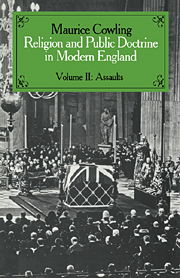Book contents
- Frontmatter
- Foreword
- Contents
- Projected contents of Volume III (for publication c. 1988–90)
- INTRODUCTION
- I THE ASSAULT ON THE EIGHTEENTH CENTURY
- II THE ASSAULT ON CHRISTIANITY
- 5 Types of Ethical Earnestness I
- 6 Types of Ethical Earnestness II
- 7 Types of Ethical Earnestness III
- III THE ASSAULT ON CHRISTIANITY IN THE TWENTIETH CENTURY
- IV ASSAULTS ON THE ASSAILANTS
- CONCLUSION: ASSAULTS AND ACCOMMODATIONS
- Notes
- Index of main names
7 - Types of Ethical Earnestness III
Published online by Cambridge University Press: 23 December 2009
- Frontmatter
- Foreword
- Contents
- Projected contents of Volume III (for publication c. 1988–90)
- INTRODUCTION
- I THE ASSAULT ON THE EIGHTEENTH CENTURY
- II THE ASSAULT ON CHRISTIANITY
- 5 Types of Ethical Earnestness I
- 6 Types of Ethical Earnestness II
- 7 Types of Ethical Earnestness III
- III THE ASSAULT ON CHRISTIANITY IN THE TWENTIETH CENTURY
- IV ASSAULTS ON THE ASSAILANTS
- CONCLUSION: ASSAULTS AND ACCOMMODATIONS
- Notes
- Index of main names
Summary
‘… Turgot was born in Paris on the 10th of May, 1727. He died in 1781. His life covered rather more than half a century, extending, if we may put it a little roughly, over the middle fifty years of the eighteenth century. This middle period marks the exact date of the decisive and immediate preparation for the Revolution … It was between 1727 and 1781 that the true revolution took place. The events from '89 were only finishing strokes, the final explosion of a fabric under which every yard has been mined, by the long endeavour for half a century of an army of destroyers deliberate and involuntary, direct and oblique, such as the world has never at any other time beheld.’
John Morley Turgot in Critical Miscellanies 2nd Series 1877 p. 137.‘The coarse and realistic criticism of which Voltaire was the consummate master, has done its work. It has driven the defenders of the old faith into the milder and more genial climate of non-natural interpretations, and the historic sense, and a certain elastic relativity of dogma … The consequence of this … is that the modern attack, while fully as serious and much more radical, has a certain gravity, decorum, and worthiness of form. No one of any sense or knowledge now thinks the Christian religion had its origin in deliberate imposture. The modern freethinker does not attack it; he explains it. And what is more, he explains it by referring its growth to the better, and not to the worse part of human nature … […]
- Type
- Chapter
- Information
- Religion and Public Doctrine in Modern England , pp. 159 - 182Publisher: Cambridge University PressPrint publication year: 1985

